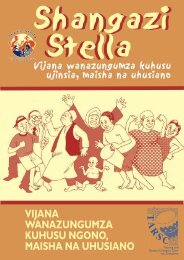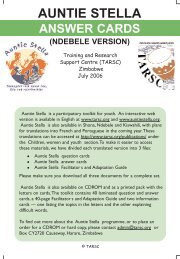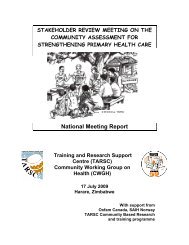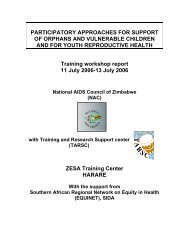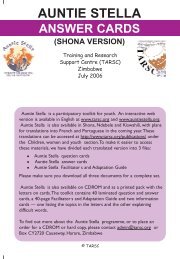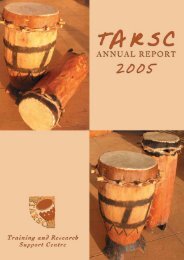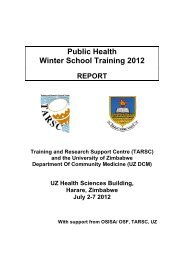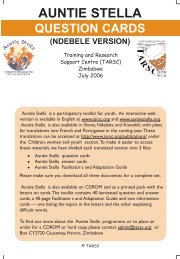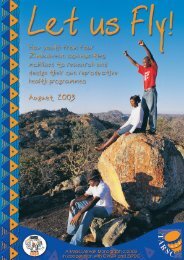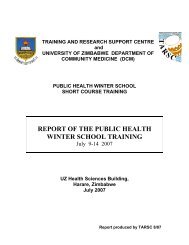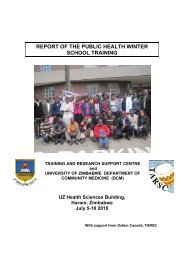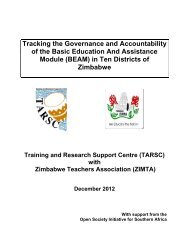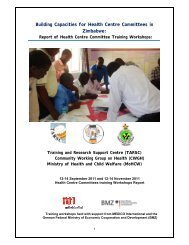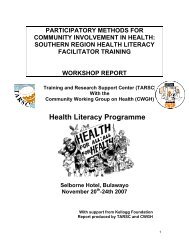HLregional meeting09.pdf - Training and Research Support Centre
HLregional meeting09.pdf - Training and Research Support Centre
HLregional meeting09.pdf - Training and Research Support Centre
You also want an ePaper? Increase the reach of your titles
YUMPU automatically turns print PDFs into web optimized ePapers that Google loves.
added that HEPS-Ug<strong>and</strong>a was in the process of developing their 2010-2015 strategic plan <strong>and</strong> the<br />
Health Literacy programme would be an integral part of the plan. The Health Literacy facilitators<br />
would come from the district facilitators working on the community outreach <strong>and</strong> empowerment work<br />
at community level <strong>and</strong> the Ministry of Health Village Health teams volunteers.. She added that<br />
HEPS organisational structure supports the implementations of Health Literacy while the Health<br />
Literacy materials would add value <strong>and</strong> capacities to the facilitators at community level<br />
“HEPS-Ug<strong>and</strong>a is so excited about the Health Literacy programme, especially the materials, they are<br />
well packaged, they last long, they are attractive to look at, they have information that we need, the<br />
graphics, picture codes <strong>and</strong> other PRA tools enhance activity <strong>and</strong> fun! We can’t wait!” Prima<br />
Kazoora- HEPS-Ug<strong>and</strong>a<br />
In groups the new country partners agreed that all the implementation steps taken by Zimbabwe,<br />
Malawi <strong>and</strong> Botswana should also define the steps for implementation. New country lead<br />
organisations agreed to carry out national advocacy, national coordination, country specific Health<br />
Literacy, material development <strong>and</strong> support community level Health Literacy. The regional support<br />
from TARSC would include regional level fundraising for the Health Literacy movement, advocacy at<br />
that level, providing the link for regional <strong>and</strong> global connect <strong>and</strong> linkages for information sharing,<br />
exchange, networking, planning <strong>and</strong> reviews.<br />
The existing country partners agreed that the transition towards translation of materials into local<br />
languages was as important as supporting <strong>and</strong> strengthening community health literacy. The focus<br />
for implementing countries would be championing Health Literacy to revitalise primary health<br />
towards people centred Health Systems. The community activities should push the Primary Health<br />
care agenda. To further strengthen the link between Health Literacy <strong>and</strong> Primary Health care, the<br />
following elements were agreed”<br />
• Create a regional base of evidence on mechanisms that enhance PHC <strong>and</strong> use that platform<br />
to engage relevant national, regional <strong>and</strong> global bodies on the ‘Health for all’ goal.(TARSC)<br />
• Integrate Health Literacy in Health systems e.g. Health Literacy facilitators could be drawn<br />
from village health workers <strong>and</strong> civil society to support government efforts at primary care<br />
level, promote sustainability <strong>and</strong> accountability.(Country partners )<br />
• Create sustainable regional linkages with regional platforms that support the same cause<br />
such as SEAPACOH, SADC, WHO, UN etc (TARSC)<br />
• <strong>Support</strong> regional exchange visits <strong>and</strong> promote regional learning workshops, review<br />
meetings, conferences etc (Country partners with TARSC)<br />
• Participation of all relevant stakeholders, alliances <strong>and</strong> actors builds trust <strong>and</strong> is key in<br />
Primary Health care. (Country partners with TATRSC)<br />
• Launch the Health Literacy social Movement process: coincide the launch with Alma Ata<br />
days (TARSC with country partners)<br />
7. Closing<br />
MS Nana Gleeson from BONELA, Botswana chaired the closing session. Ms Machingura, TARSC<br />
provided a consolidated summary of the key issues raised for future planning in implementing<br />
country partners <strong>and</strong> in new country partners. Ms Machingura thanked all delegates for the<br />
committed participation during the intensive <strong>and</strong> successful two day meeting. She pointed that<br />
TARSC would continue to give technical support <strong>and</strong> mentorship to existing country partners <strong>and</strong> to<br />
new country partners. She encouraged Health Literacy country partners to keep focused on the<br />
agenda of primary health care <strong>and</strong> noted that it was possible to have comprehensive primary health<br />
care oriented health systems. Ms Machingura added that some of the reflections <strong>and</strong> discussions in<br />
the two-day meeting would be consolidated in the regional health literacy evaluation while some<br />
inputs would be used to inform the regional proposal of work <strong>and</strong> future work in East <strong>and</strong> Southern<br />
Africa.<br />
Ms Nana Gleeson reaffirmed that the visionary goal of ‘Health for all’ is what Health Literacy seeks to<br />
support. While efforts to revitalize primary health care can be addressed by other interventions,<br />
Health Literacy has given evidence to show that it is the most effective social empowerment process<br />
that will organize people’s power to build national health systems that are people centered. People<br />
centered Health systems address equity issues, answers questions on reduction of poverty <strong>and</strong><br />
stimulate creativity, well-being <strong>and</strong> development. After a vote of thanks to TARSC by Ms. Prima<br />
Kazoora, HEPS Ug<strong>and</strong>a, Ms Nana Gleeson, chairing the session closed the meeting.<br />
27



